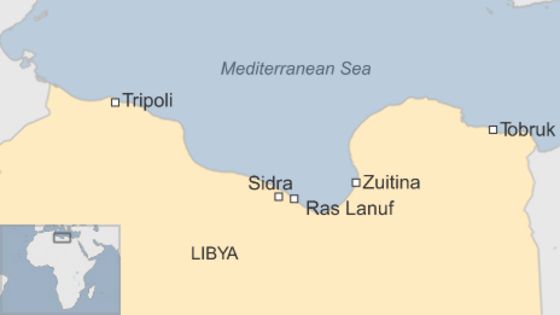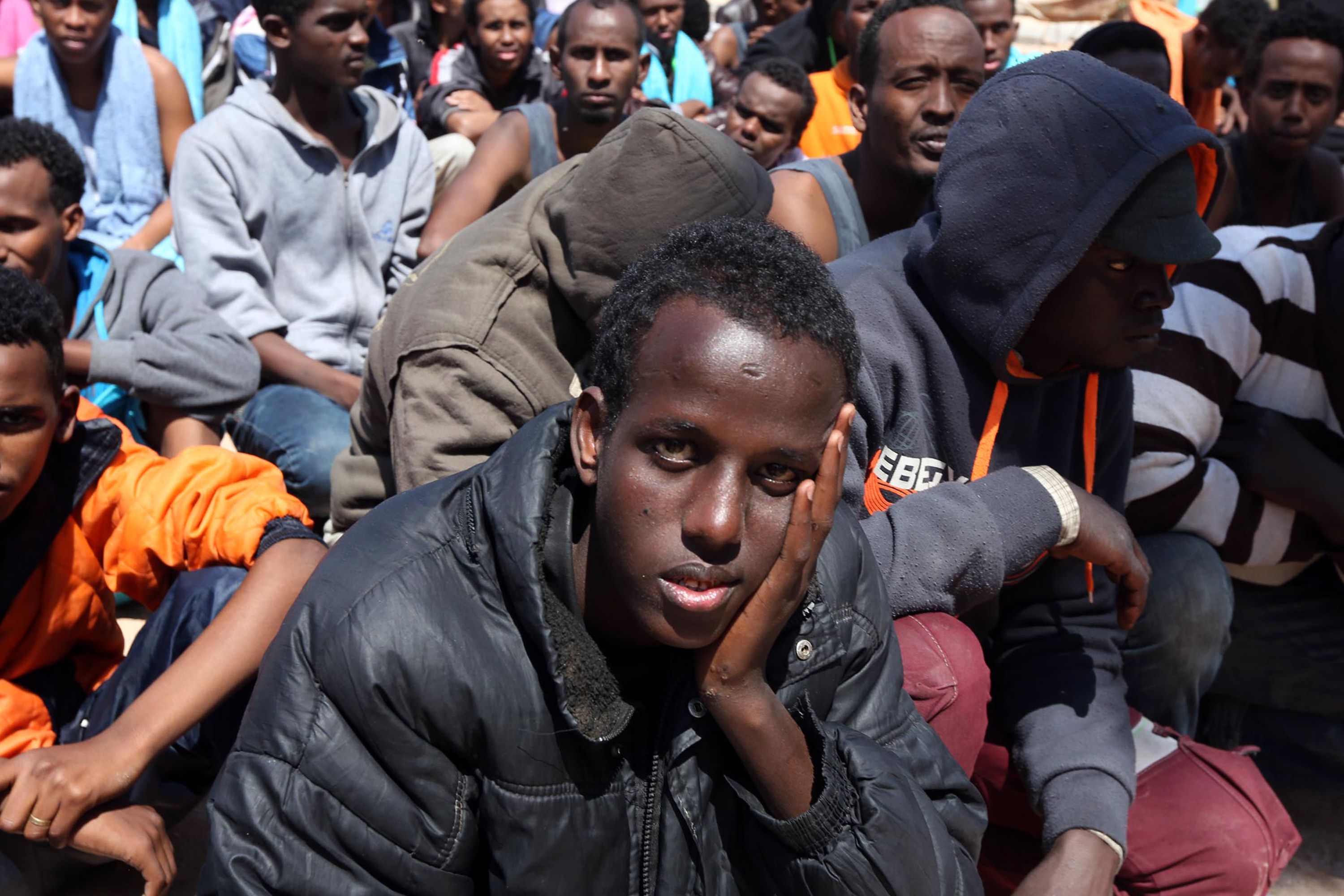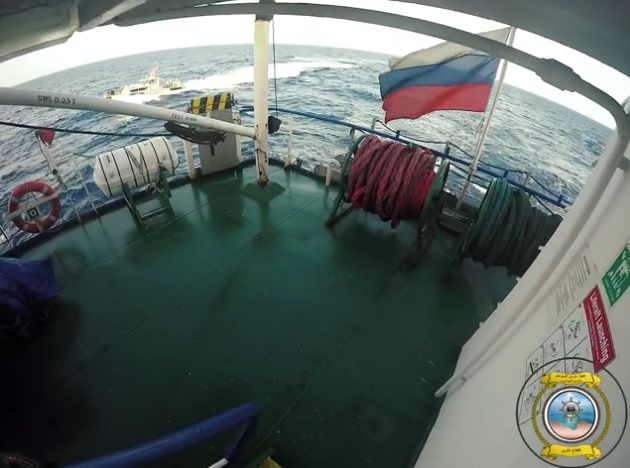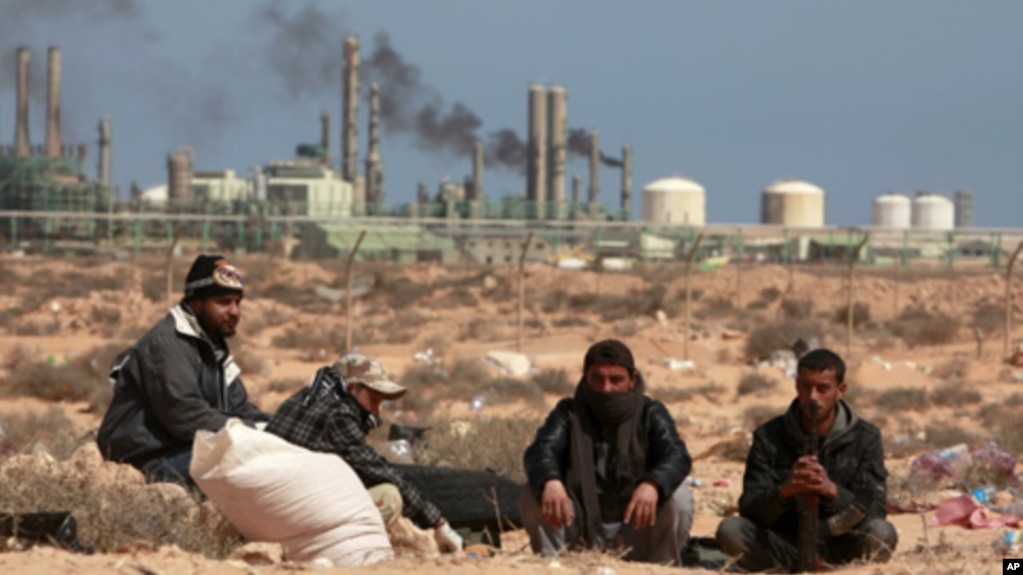Kremlin’s game: What Moscow is looking to achieve in Libya
http://rbth.com/international/2017/02/28/kremlins-game-what-moscow-libya-710741

Marshal Khalifa Haftar, chief of the so-called Libyan National Army, leaves the main building of Russia's Foreign Ministry after a meeting with Russian M Lavrov (NOV 2016)
++
On Feb. 20 Russian state company Rosneft signed an agreement on cooperation with Libya's National Oil Corporation (NOC). This happened only a few days after Britain’s Secretary of State for Defense Michael Fallon warned Russia against interference in the affairs of Libya. The oil deal in the context of the events of the past year may mean a gradual increase of Russian involvement in Libya.
Hoping for the return of contracts
In 2008, then-Prime Minister Vladimir Putin signed a number of major contracts with Libyan leader Muammar Gaddafi. These contracts covered oil and gas production, construction, railways and weapons. The total value of the agreements was estimated to be about $10 billion.
The signing of the contracts became a breakthrough event in the relations between Moscow and Tripoli, whose cooperation was minimized after the collapse of the Soviet Union.
The implementation of these promising agreements was prevented by the Arab Spring and the subsequent war in Libya. Russia lost contracts worth billions of dollars.
A slight hope for the return of Russian big businesses to Libya appeared in April 2015, when the head of the Council of Deputies, also known as the Tobruk government, Abdullah al-Thani came to Moscow. Al-Thani reminded Russia about its committed investments in Libya and proposed a return to the implementation of the earlier projects.
However, in January 2016 the United Nations declared that henceforth the legitimate authority in the country was the Government of National Accord (GNA) in Tripoli, not the Tobruk government. This decision significantly reduced the role of government of Abdullah al-Thani, which was supported by the head of the Libyan National Army General Khalifa Haftar.
Moscow and General Haftar
Khalifa Haftar is a political heavyweight in the Libyan scene and is believed to enjoy real power in large parts of the country. The Western press often refers to him as ‘Libya's most potent warlord.’
Moscow formally recognized the government of national unity in Tripoli as the legitimate authority in Libya, but has partnered with General Haftar and the government in Tobruk as well.
The first real evidence of interaction of Moscow and head of the Libyan National Army was the request by Haftar to print 4 billion Libyan Dinar. The order was executed by the Russia’s state-owned Goznak enterprise, and in May 2016, a Russian ship delivered a batch of printed notes to Libya.
In June and November 2016, Khalifa Haftar visited Moscow, where he talked about the possibility of arms supplies. In response, Moscow reiterated that it would not violate the international embargo on arms supplies to Libya without the permission of the UN.
Finally, in January 2017, the Russian aircraft carrier Admiral Kuznetsov, en route from Syria, halted in Tobruk. Khalifa Haftar visited the ship and had a video conference call with Russian Defense Minister Sergey Shoigu.
Why Russia needs Libya
Officially, Russian involvement with Libya’s NOC was mostly confined to rhetoric.
However, there are assumptions that injured colleagues of Khalifa Haftarа have been sent for treatment to Moscow and a small number of Russian military instructors are already operating in Libya.
As noted by American analysts, it is unlikely that Moscow would seriously be interested in the supply of arms or a central role in rebuilding the country after the war.
From an economic point of view, Libya has great potential in the oil and gas industry. At the same time, according to Gazeta.ru the energy sector in the country today offers the possibility of quick returns but this comes with high risks associated with political instability.
Libya could help Russia significantly expand its capabilities in the Mediterranean. A big buzz was caused by the assumption that during the video conference on board the Admiral Kuznetsov, General Haftar agreed to Moscow’s informal request for the creation of two military bases in Tobruk and Benghazi.
International support
Today Libya is a failed state on whose territory there are two rival governments, radical Islamists and many small independent groups. In this regard, the prospects for increasing the involvement of Russia in the affairs of the North African country is assessed by different actors in different ways.
Thus, Egypt and the UAE actively support Khalifa Haftar, considering him the only force in Libya who can fight the Islamists in the future to stop the division of the country. These states are now bypassing UN sanctions, supplying arms to the Libyan National Army. They welcome any help to Haftar from the rest of the world.
According to some reports, Italy is positive about the idea of Moscow's participation in resolving the crisis in Libya. Rome might hope that Russia can thus help solve its key problem – tens of thousands of illegal migrants arriving in Italy via Libyan territory.
The rest of the Western world is wary about the increase of Russia’s influence in Libya. The EU is trying to convince Moscow to stop supporting the Libyan General, claiming that Haftar should be only part of the solution to the crisis in the country. However, some media have warned that Moscow's participation may lead to a new Pro-Russian dictator coming to power in Libya.
http://rbth.com/international/2017/02/28/kremlins-game-what-moscow-libya-710741

Marshal Khalifa Haftar, chief of the so-called Libyan National Army, leaves the main building of Russia's Foreign Ministry after a meeting with Russian M Lavrov (NOV 2016)
++
On Feb. 20 Russian state company Rosneft signed an agreement on cooperation with Libya's National Oil Corporation (NOC). This happened only a few days after Britain’s Secretary of State for Defense Michael Fallon warned Russia against interference in the affairs of Libya. The oil deal in the context of the events of the past year may mean a gradual increase of Russian involvement in Libya.
Hoping for the return of contracts
In 2008, then-Prime Minister Vladimir Putin signed a number of major contracts with Libyan leader Muammar Gaddafi. These contracts covered oil and gas production, construction, railways and weapons. The total value of the agreements was estimated to be about $10 billion.
The signing of the contracts became a breakthrough event in the relations between Moscow and Tripoli, whose cooperation was minimized after the collapse of the Soviet Union.
The implementation of these promising agreements was prevented by the Arab Spring and the subsequent war in Libya. Russia lost contracts worth billions of dollars.
A slight hope for the return of Russian big businesses to Libya appeared in April 2015, when the head of the Council of Deputies, also known as the Tobruk government, Abdullah al-Thani came to Moscow. Al-Thani reminded Russia about its committed investments in Libya and proposed a return to the implementation of the earlier projects.
However, in January 2016 the United Nations declared that henceforth the legitimate authority in the country was the Government of National Accord (GNA) in Tripoli, not the Tobruk government. This decision significantly reduced the role of government of Abdullah al-Thani, which was supported by the head of the Libyan National Army General Khalifa Haftar.
Moscow and General Haftar
Khalifa Haftar is a political heavyweight in the Libyan scene and is believed to enjoy real power in large parts of the country. The Western press often refers to him as ‘Libya's most potent warlord.’
Moscow formally recognized the government of national unity in Tripoli as the legitimate authority in Libya, but has partnered with General Haftar and the government in Tobruk as well.
The first real evidence of interaction of Moscow and head of the Libyan National Army was the request by Haftar to print 4 billion Libyan Dinar. The order was executed by the Russia’s state-owned Goznak enterprise, and in May 2016, a Russian ship delivered a batch of printed notes to Libya.
In June and November 2016, Khalifa Haftar visited Moscow, where he talked about the possibility of arms supplies. In response, Moscow reiterated that it would not violate the international embargo on arms supplies to Libya without the permission of the UN.
Finally, in January 2017, the Russian aircraft carrier Admiral Kuznetsov, en route from Syria, halted in Tobruk. Khalifa Haftar visited the ship and had a video conference call with Russian Defense Minister Sergey Shoigu.
Why Russia needs Libya
Officially, Russian involvement with Libya’s NOC was mostly confined to rhetoric.
However, there are assumptions that injured colleagues of Khalifa Haftarа have been sent for treatment to Moscow and a small number of Russian military instructors are already operating in Libya.
As noted by American analysts, it is unlikely that Moscow would seriously be interested in the supply of arms or a central role in rebuilding the country after the war.
From an economic point of view, Libya has great potential in the oil and gas industry. At the same time, according to Gazeta.ru the energy sector in the country today offers the possibility of quick returns but this comes with high risks associated with political instability.
Libya could help Russia significantly expand its capabilities in the Mediterranean. A big buzz was caused by the assumption that during the video conference on board the Admiral Kuznetsov, General Haftar agreed to Moscow’s informal request for the creation of two military bases in Tobruk and Benghazi.
International support
Today Libya is a failed state on whose territory there are two rival governments, radical Islamists and many small independent groups. In this regard, the prospects for increasing the involvement of Russia in the affairs of the North African country is assessed by different actors in different ways.
Thus, Egypt and the UAE actively support Khalifa Haftar, considering him the only force in Libya who can fight the Islamists in the future to stop the division of the country. These states are now bypassing UN sanctions, supplying arms to the Libyan National Army. They welcome any help to Haftar from the rest of the world.
According to some reports, Italy is positive about the idea of Moscow's participation in resolving the crisis in Libya. Rome might hope that Russia can thus help solve its key problem – tens of thousands of illegal migrants arriving in Italy via Libyan territory.
The rest of the Western world is wary about the increase of Russia’s influence in Libya. The EU is trying to convince Moscow to stop supporting the Libyan General, claiming that Haftar should be only part of the solution to the crisis in the country. However, some media have warned that Moscow's participation may lead to a new Pro-Russian dictator coming to power in Libya.















